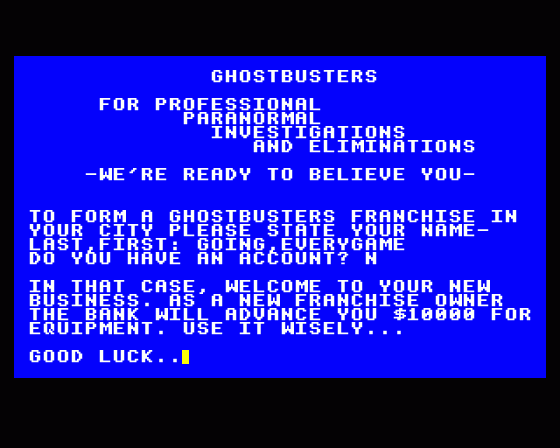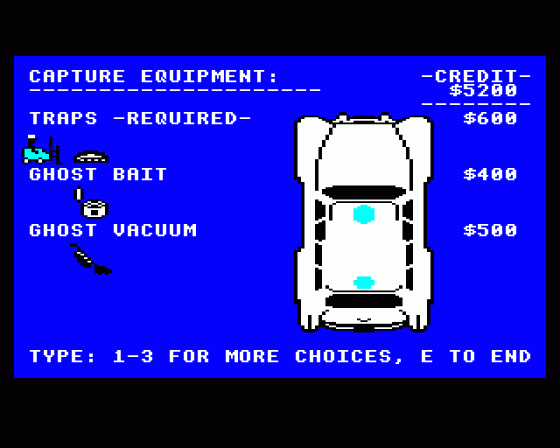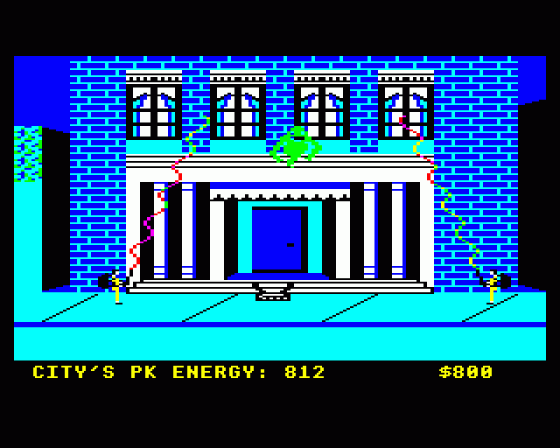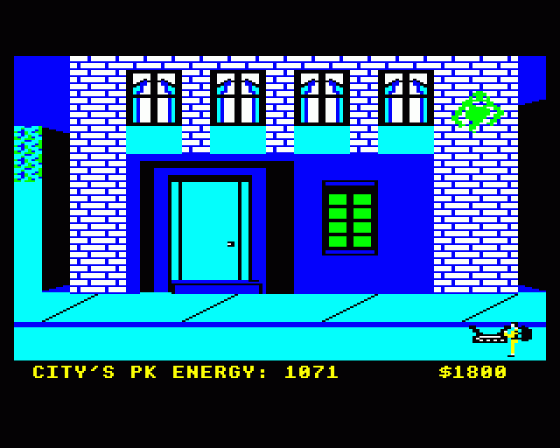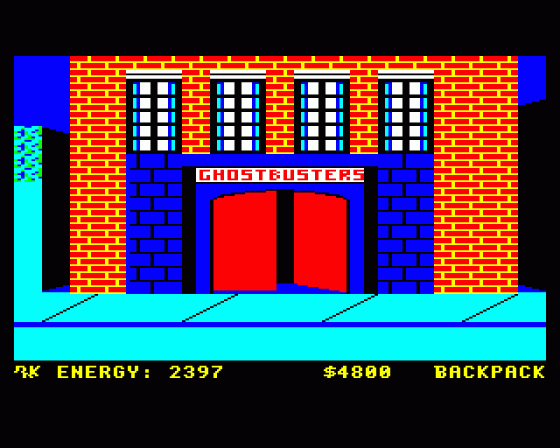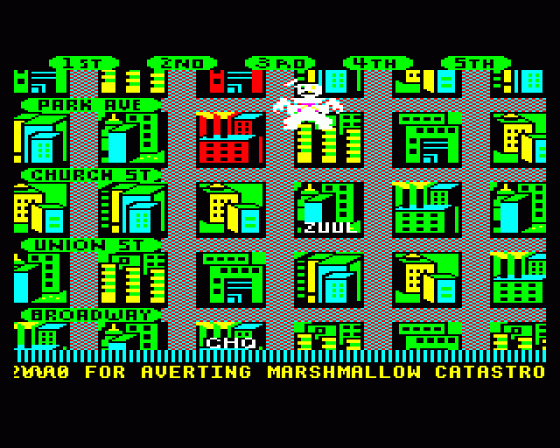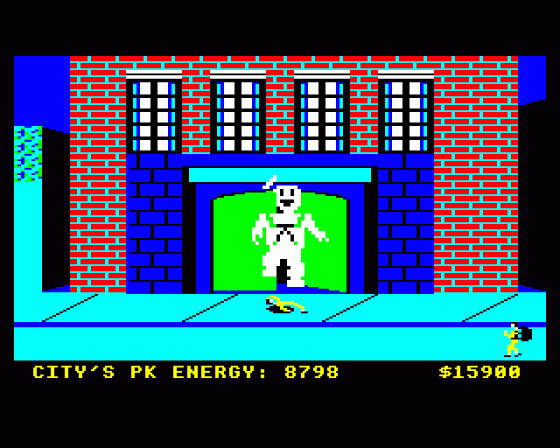
Everygamegoing
 28th July 2024
28th July 2024
Categories: Review: Software
Author: Dave E
Publisher: Chris Bradburne
Machine: BBC B/B+/Master 128/Master Compact
Ghostbusters
I was a five-year boy in 1984 when the first Ghostbusters movie came out and, for a lot of us boys of that age, the movie was seriously cool. Its launch also coincided with the arrival of home computers, and Activision picked up the licence in the UK to produce a game based on the film. Activision went on to produce Ghostbusters, the game, for the "popular" Spectrum, Commodore 64 and Amstrad 8-bits, and even the much-less-popular (in the UK) Apple II and MSX got the game. But the game never made it to the Acorn machines. I have a sneaking suspicion that a conversion of it was probably started - as Activision produced a newsletter at the time and indicated it would be producing the game for those machines - but, for whatever reason, it never got written. And if it did get written, but just somehow didn't get released, then the unreleased code has never been recovered.
Unless you were there, in this era and in that melee of Ghostbusters-related merchandise, and stuck with a computer that didn't have the game, you can't even begin to imagine how disappointed I was. To make matters worse, in that era of independent computer shops and magazines that often "missed" many of the latest releases, I was unfortunate enough to live across the road from a boy called Scott. Scott repeatedly assured me that Ghostbusters did exist for the BBC and Electron, because he'd got it and played it regularly. My disbelief that this could be true only led to him getting more beligerent about it. And, well, you can probably guess where this is going. Scott was one of those kids that got off on talking rubbish. If he really did have it, I really wanted to borrow it and play it. And I mean, I really wanted to play that game. It just wasn't the same having to visit Andrew Brown who owned a Toshiba MSX and playing it there - I wanted to play that game whenever I wanted to. So, whilst I didn't really believe that Ghostbusters for the Beeb could exist, for a few days at least I was 'hopeful' that Activision might have released it and Scott might, just somehow, have got the game from some outlet outside of my hometown. Of course, when Scott started to tell me he'd lent it to John and John has lost it (and the John in question said none of that had happened), I lost that faith pretty quickly.
It is now all of four decades later and, to my inner child, who has clearly not aged a day in the meantime, something near-miraculous has happened. Yes, an all-singing, all-dancing version of Ghostbusters for the BBC is here. Finally. It's time to get groovin' to that Ray Parker Junior theme music, and bustin' your way through Manhattan.
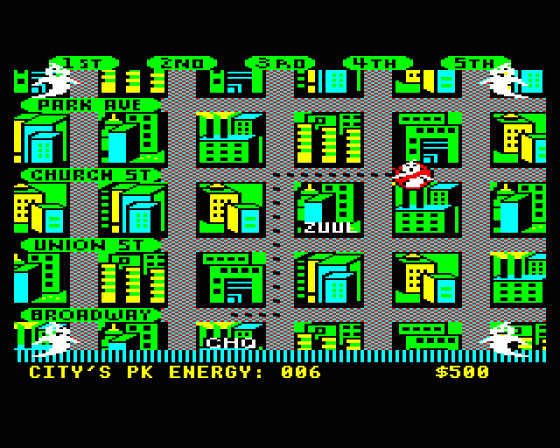
Armed with my almost encyclopaedic knowledge of how the original game plays, it's actually pretty tempting to just declare that this conversion is perfect and just leave it at that. But I won't, because I assume that at least some of you reading this won't have ever played Ghostbusters before, and my (completely irrelevant) childhood reminiscences will do little to tempt you to download it or not. So let's take a look at how the game plays, because it's really one of those games that does split opinion. Either you love it, or you think it's one of the most boring things you've ever played. Spoiler: I am in the first category.
The first thing that might surprise you if you're a fan of the film, is that you don't control Venkman, Stantz or Spengler, the "actual" filmic Ghostbusters. Instead, the game is about you - as in, you personally. You are the holder of a "Ghostbusting franchise" and you start the game by deciding how you're going to allocate $10,000, an amount the bank has loaned to you to start your new business enterprise. You must choose at least one car and at least one trap (a thing you place on the ground and which sucks in an errant ghost), but what you do with the rest of the wonga is entirely up to you. There are a selection of items to tempt you - a PKE meter, an image intensifier, a ghost vacuum, a portable laser containment system and, naturally, more traps - and the game cleverly dangles these items in front of you even if you cannot afford them. There's no requirement to buy them - indeed, to win the Ghostbusters game you must not only get to the temple of Zuul, you must also make more money than you started with. So pimping up your ride to the fullest extent means you'll have to earn at least $10,000 in-game. That probably won't be achievable on your very first go.
Assuming you're tooled up, you then proceed to the map screen, which lays out a grid of roads and intersections. You're in control of a Ghostbusters logo which can scoot around the roads. From each of the four corners of the screen come some menacing-looking ghosts, and they glide towards the centre of the map, the temple of Zuul, unless you touch them in which case they immediately stop. Each time a ghost successfully makes it to Zuul, the city's psycho-kinetic energy increases (a PKE meter is shown at the base of the screen), so it's worth either tagging them either to buy time or simply because you're en route to a building which is experiencing supernatural activity.
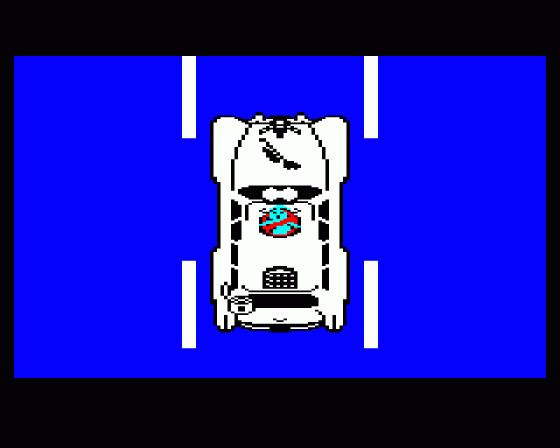
The map screen is actually a little more complex than it at first appears, with the Ghostbusters HQ at the bottom of the screen, Zuul in the middle and the possibility of any number of the other buildings suddenly flashing red to simulate that a call has come into Ghostbusters HQ to report a haunting. Move over to a red building and press Fire to "lock in" the journey to it. Yes, like some primitive sat-nav, it turns out that all that gliding about on the map doesn't actually take you anywhere, it merely plots a route for you to follow. You then get to complete the "drive" to your destination. This "drive" involves an overhead view of whatever car you bought sitting in the middle of the screen as a road scrolls past. If you've mapped out a long route, for example touching the ghosts at all four corners of the map before choosing a destination, the time it takes for your car to go from A to B can be a long, long time. There are diversions en route if you have indeed touched the ghosts - because they float down the screen, and can be vacuumed up for cash if you invested in the Ghost Vacuum earlier - but, if not, then this section is coma-inducing stuff. I'll come back to this aspect in a moment.
In the only bit of 'real' arcade action the game really presents, finally (!) you arrive at your destination and get to try and catch the ghost. This involves (a) dropping a trap in the middle of the screen, (b) positioning one man on the extreme left of the screen, and (c) positioning the other on the extreme right. Turn on the famous proton packs to emit streams and keep the slimer between them, manoeuvring both men in turn into a position where he's eased directly above the trap and then, with luck, a quick tap on the Fire button will open the trap and catch him. And, after that, you get paid and one of your traps is now 'full' and needs to be returned to HQ to be emptied.
Things, however, can go wrong. You can cross the streams, fortunately shorting out their circuitry rather than prompting a cataclysmic explosion. You can run out of time/proton charge, when the ghost maddeningly won't go where you want him to. Or, on rare occasions, the ghost can actually escape. If the trap springs open but doesn't succeed in pulling the ghost into it, he makes a beeline for one of your men and slimes him, putting him out of action and necessitating another trip back to HQ to clean him up.
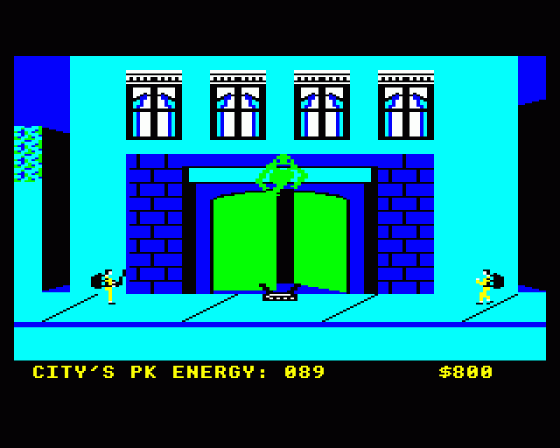
Ghostbusters is... those three scenes (map, drive and building) repeated over and over again. As you start making money and juggling trips to HQ with the performance of whatever car you've chosen and whether or not you need to lengthen or shorten the time you have to make more than what you started, you're "playing" this game. It gets more frantic as it goes on, with more buildings lighting up in red, the map screen ghosts speeding up, and the odd appearance of the Marshmallow Man who you must distract immediately he appears by pressing the B key (for Ghost Bait) - you'll know if he's coming if you invested in the Marshmallow Alert. If he tramples down a building, you are fined a whopping $4,000, which can instantly take you from profit to loss.
Eventually it all comes to a head and you're told "Go To Zuul", where you must get at least two of your men into the temple by easing them under a bouncing Stay Puft Marshmallow Man - which is very hard indeed. If you manage it, well, that's a win and you'll be told how much money you finished the game with. Very cleverly indeed, you can then start a subsequent game with this increased amount rather than $10,000, opening up all manner of combinations of equipment and cars to experiment with.
Some people think Ghostbusters is boring because it's so repetitive. And it is. All you do is roam the map, drive to the buildings, catch the ghosts, go back to HQ and repeat until it's time to go to the temple of Zuul. It's not really an exciting game. Graphically it's colourful and the iconic theme music - which plays throughout - never gets old. I can't lie and commend its playability in terms of any sort of action. But my opinion is that it's not in the execution of the game that you find the playability. Rather, the playability is in the decisions you take throughout it, and how unique it is in rewarding you for not taking certain decisions. For example, suppose you opt to run the poorest Ghostbusters' franchise ever. You buy the cheapest car and a single trap, stick the rest of the cash in a Swiss Bank Account and figure you'll catch six ghosts and then just kill time until Go To Zuul flashes up. Even worse, you're the type of person who can't sit still so you race around the map touching all the ghosts before any calls come in. Well, you're not going to have a great experience. You'll be driving forever, and, because you didn't buy the Image Intensifier, you'll have difficultly even seeing the slimers you want to catch. If you do manage to get one, well, you've only got one trap so it'll be all the way back to HQ for you after every single success. The Marshmallow Man will then pop up and probably drain any profits you made to zero. And it'll be RIP Ghostbuster Scrooge.
However, if you buy a decent car and a decent amount of gear then choose not to move until a building begins flashing red, the driving will be short, you'll be more likely to catch the ghost and you won't have to immediately return to HQ to empty the trap. Yes, you'll need to catch more ghosts to break even, but you'll also know when the Marshmallow Man is coming, and have bait to drop to prevent him causing damage. The repeating nature of the game is, of course, still there - and it's not until you've actually played it a few times that you start to realise "how" to play it - but, when it clicks, it comes together in such a way that, despite how repetitive it is, it does in fact work. And one more thing to bear in mind is that Ghostbusters is really a completely unique experience - the map screen, driving section and ghost catching combined with a rudimentary business simulation isn't a formula you'll find in any other game. The only thing I can think of which is even slightly similar is the old Coco/Dragon game Poltergeist and even that's not all that close.
As you might have deduced from the introduction to this review, I was always going to love a good version of Ghostbusters on the BBC. This conversion is positively delightful. It plays like a dream and has everything a fan of the original could ever have expected. I personally would go so far as to say this is one of the best BBC games ever written. I've already sunk more than 50 hours into it and will likely not stop replaying it until I die. From the bouncy scrolling song lyrics on the opening screen to the final Game Over, bustin' really does make me feel good. And now I really must look up Scott on Facebook and let him know how I'm filling my time, right?

